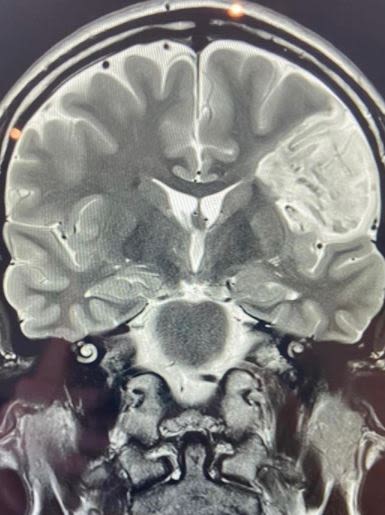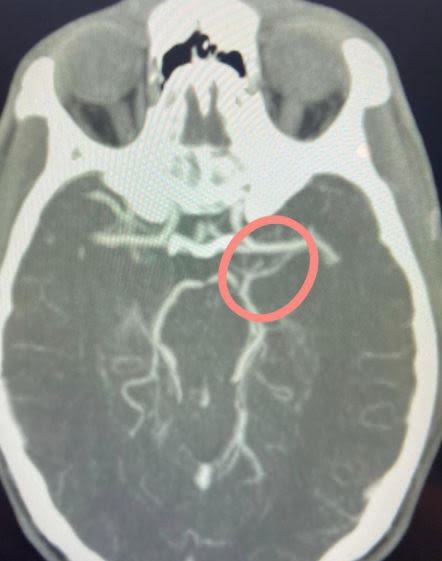ARE YOU TOO YOUNG TO HAVE A STROKE?
STROKE AWARENESS MONTH

THE BASICS
F.A.S.T. Face, arm, speech and time.
We’ve all seen the advert that teaches us the main signs to look out for and the action to take when you think someone is having a stroke.
But does our knowledge of strokes go beyond what we’ve seen on the TV?
There are two main types of stroke, ischaemic (due to a blocked blood vessel in the brain) and haemorrhagic (due to bleeding in the brain).
There are more than 100,000 strokes in the UK each year, that's one every five minutes, according to stroke.org.uk.
Survivors are at greatest risk of having another episode in the first 30 days of recovery. One in four will experience another within five years.
Research also suggests people over the age of 55 are the most likely to suffer from a stroke.
In England, Wales and Northern Ireland the average age for a male to have an episode is 74, whilst in women it's slightly older at 80.
There are also over 400 childhood strokes a year in the UK.
It's a common misconception that strokes are only associated with the elderly and for most young people, the thought of suffering from one would seem nearly impossible at a young age.
This was the case for one 28-year-old Ali Turpie who found out the hard way that you are never to young to have a stroke.

A week later on the 17th of December Ali said his first word, "mum".
Following five nights in St. Peter's hospital in Chertsey, Ali was moved to the Bradley neuro rehabilitation unit in Woking for rehab.
Ali went through 10 days of intense therapy to improve his speech and was able to articulate his needs with one or two words.
He was also able to use a whiteboard to help with his communication.
On Christmas Eve he was deemed medically fit and allowed home.
A few days after Christmas he had his first speech therapy session over Zoom with Lisa Harris, a neuro speech and language therapist.
The beginning of a long journey.
ALI'S STORY
In the early hours of Thursday 10th December 2020, Ali Turpie suffered a stroke at the age of 28.
How does a fit, healthy young man under the age of 30 suffer from a stroke?
The question still goes unanswered.
In a taxi on his way back home from work to Surrey, he suddenly lost his ability to speak.
After around an hour of trying to tell the driver his girlfriend Liv's address he finally made it, still not able to speak.
Greeting Ali at the door along with the driver, Liv had no idea what was going on.
"I felt like I was in a dream and this wasn't happening why is he not speaking?"
Noticing a slight droop on one side of his face and not being able to speak or type out anything on a phone, Liv was quick to Google his symptoms which suggested a stroke, she then called 999.
"He even considered going to bed. Thank god he didn't"


Ali was diagnosed with left middle cerebral artery infarct, suffering from aphasia and apraxia.
In simple terms this means he suffered an interruption of blood flow to an area of the brain, which resulted in the loss of speech.
Not only couldn't he speak but Ali had also lost the ability to match words and actions, like moving your mouth to speak.
At the hospital, it took around two hours before he received a clot busting drug after doctors queried a brain tumour.
The first scan on the left shows the damage to the left frontal lobe, which you can see in a white cluster.
The second image shows a new vessel that Ali's brain created just 18 days after his episode.
Throughout the last five months, Ali has had daily speech therapy, got back behind the wheel and taken up fitness again.
Not only that but he has taken to social media to raise awareness for strokes in young people.
He has documented his journey on Instagram, The Apraxia Man.
Unable to drink alcohol and go to the pub, he decided to try out a whole range of non alcoholic drinks and rate each one.
Luckily he hasn't missed out on much during lockdown!
Not only has Ali had to learn to speak again, he is also having to relearn to add emotion to his speech.
Ali has also been singing to help with his speech as songs and nursery rhymes have repetition and rhythm that can be remembered.
One huge supporter of this in particular is English hip hop artist Loyle Carner.
After Ali posted a video of him singing to one of his songs Loose Ends, Loyle replied showing his support and challenged him to perform a different song of his each month to keep up to date with his progress.
"Beautiful thing to see man, I'm proud of you"
Before his stroke, Ali was running to raise money for mental health awareness and to encourage people to open up and talk.
He challenged himself to run 10k every day for 28 days.
This was alongside his full time job as a sports broadcast director, which he intends to return at a later date.
Ali raised £12,000 in a month for mental health
Ali raised £12,000 in a month for mental health
RAISING AWARENESS
Ali's story is one of many that is proof you are never too young to have a stroke.
He aims to continue to raise awareness to help others.
Do you know enough about strokes? Can you spot the signs of a stroke? Would you know how to react?
With a huge support network behind him, a GoFundMe page was also set up to help with his recovery, which has a current total of £63,841.
You can donate here, Mending Ali.
MAKE MAY PURPLE
STROKE AWARENESS MONTH

